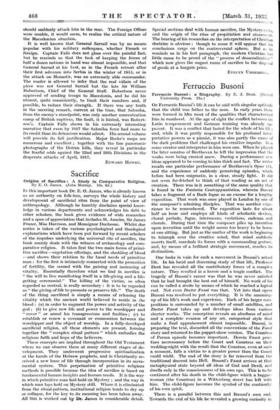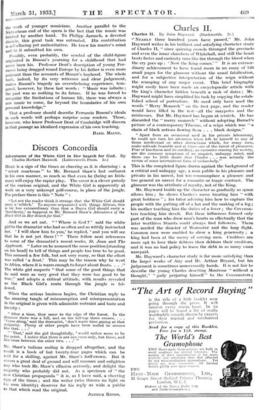Ferruccio Busoni OF Ferruccio BusOnes life it can be said
with singular aptitude that the child was father to the man. In early years there were formed in him most of the qualities that characterized him in manhood. At the age of eight the conflict between his Latin temperament and German training was already ap- parent. It was a conflict that lasted for the whole of his life ; and, while it was partly responsible for his profound inter- pretative powers as a pianist, it was also partly the cause of the dark problems that challenged his creative impulse. In a sense creator and interpreter in him were one. When he played the later sonatas of Beethoven he left the impression that the works were being created anew. During a performance new ideas appeared to be coming to him thick and fast. The writer recalls one particular performance of Beethoven's Opus 1U, and the experience of suddenly perceiving episodes, which before had been enigmatic, in a clear, steady light. It did not seem far-fetched to think of that reading as an act of creation. There was in it something of the same quality that is found in the Fantasia Cantrappuntistiza, wherein Busoni takes a fragment of a Bach fugue as an excuse for a lengthy exposition. That work was once played in London by one of the composer's Admiring disciples. That was another expe- rience to be remembered. The exposition lasts for about half an hour and employs all kinds of scholastic devices, choral prelude, fugue, intermezzo, variations, cadenza and chorale. During that time the composer piles up invention upon invention until the weight seems too heavy to be borne at one sitting. But just as the matter of the work is beginning to triumph over the creative mind, that mind suddenly asserts itself, marshals its forces with a commanding gesture, and, by means of a brilliant strategic movement, reaches its destination.
One looks in vain for such a movement in Busoni's actual life. In his lucid and discerning study of that life, Professor Dent has revealed all the contributory forces of a complex nature. They resulted in a heroic and a tragic conflict. The tragedy of Busoni's career was that he was never satisfied that he had brought the best out of himself. No work of his can be called a siren° by means of which he reached a logical end. Not even Doctor Faust was that. Yet into that opera Busoni was resolved to put everything. It is the summing- up of his life's work and experience. Each of his larger com- positions is surrounded by a number of small satellites, and Doctor Faust takes up and develops ideas from various shorter works. The conception reveals an aloofness of mind and a complete evasion of any set, categorical style that make a final appraisement almost impossible. Busoni, in preparing the text, discarded all the conventions of the Faust story and returned to the puppet-show version. The Countess of Parma episode becomes important. Herein Faust prac- tises necromancy before the Count and Countess on their wedding-night with the result that the Countess, even at such a moment, falls a victim to a greater power than the Count could wield. The end of the story is far removed from the traditional descent into Hell. Busoni's Faust arrives at that metaphysical state beyond all ideas of God and Devil, and dwells only in the consciousness of his own ego. This is to be continued after his death in the child-figure which a beggar- woman (the Countess) in a Wittenberg street has left with him. The child-figure becomes the symbol of the continuity of his own spirit.
There is a parallel between this and Busoni's own end. Towards the end of his life he revealed a growing curiosity in the work of younger musicians. Another parallel to the Nietzschean end of the opera is the fact that the music was finished by another hand. To Philipp Jarnach, a devoted disciple, this great task was entrusted. His contribution is self-effacing yet authoritative. He knew his master's mind and to it submitted his own.
Possibly, even probably, the symbol of the child-figure originated in Busoni's yearning for a childhood that had never been his. Professor Dent's description of young Fer- ruccio being dragged round Europe by his father is even more poignant than the accounts of Mozart's boyhood. The whole book, indeed, by its very reticence and clear judgement, makes Busoni's tragedy an overwhelming experience, tem- pered, however, by these last words : " Music was infinite : the past was as nothing to its future. If he was forced to recognize the limitations of human life, there was always a new music to come, far beyond the boundaries of his own personal knowledge."
That a professor should describe Ferruccio Busoni's ideals in such words will perhaps surprise some readers. Those, however, who know Professor Dent of Cambridge will discern in that passage an idealized expression of his own teaching. -
BASIL MAINE.









































 Previous page
Previous page